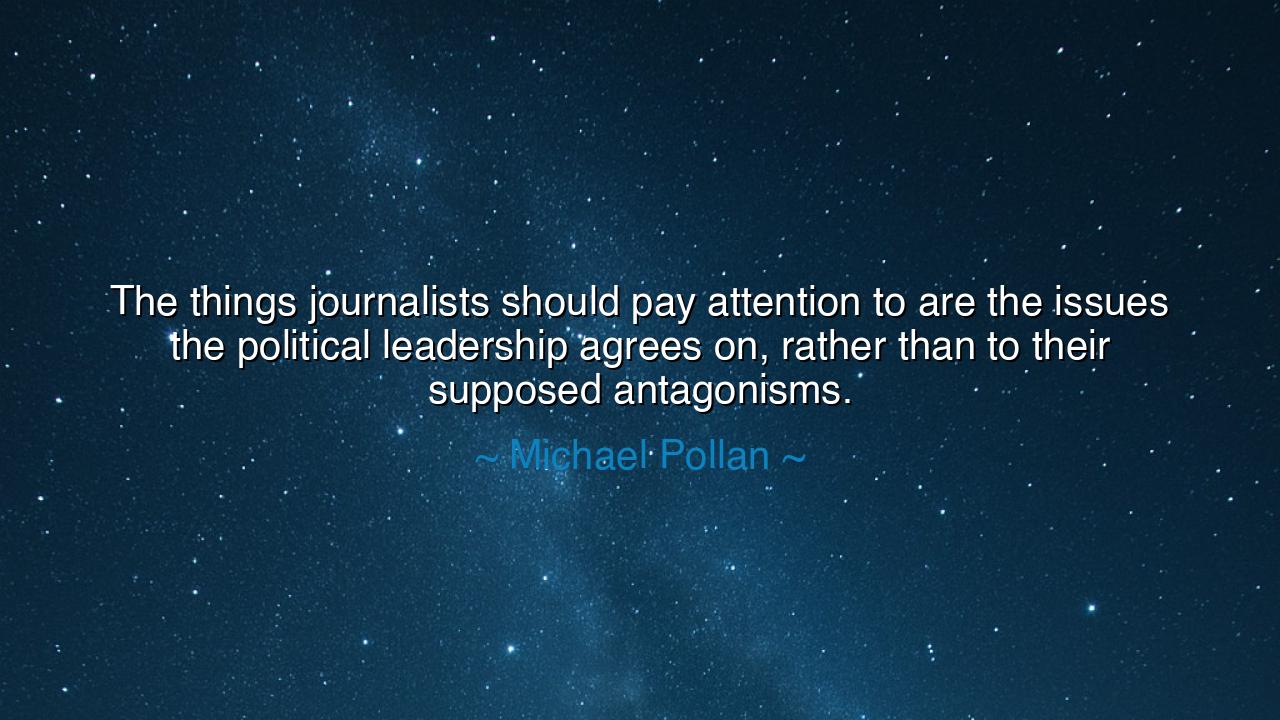
The things journalists should pay attention to are the issues the
The things journalists should pay attention to are the issues the political leadership agrees on, rather than to their supposed antagonisms.






The words of Michael Pollan — “The things journalists should pay attention to are the issues the political leadership agrees on, rather than to their supposed antagonisms” — are not merely a critique of media practice, but a profound meditation on power, truth, and the unseen harmonies that shape the destiny of nations. In this statement, Pollan, a writer known for revealing hidden systems — from agriculture to culture — speaks with the insight of a modern philosopher. His words pierce the veil of spectacle and remind us that the greatest truths often hide not in conflict, but in consensus. Where the powerful appear to disagree, there is noise; where they quietly agree, there is policy, law, and the shaping of lives.
Pollan’s reflection arises from a deep understanding of how societies are governed — not by open debate alone, but by shared interests that often transcend the theater of partisanship. The people are shown arguments, divisions, and rivalries, yet behind the curtain, decisions are made in unison. When he urges journalists to focus on what the political elite agree upon, he calls them back to their sacred duty — to be watchmen of the truth, not mere narrators of the drama. The true danger to liberty, he implies, lies not in the noise of disagreement, but in the silence of consent. For tyranny seldom comes shouting; it comes disguised in unity.
This truth is ancient. In the days of Rome, while senators quarreled in the Forum for the eyes of the people, the real alliances were struck in marble halls away from public hearing. Even the mighty Julius Caesar, before crossing the Rubicon, was not alone in ambition; he had long been joined by men who shared his hunger for power — Crassus and Pompey among them — rivals in appearance, yet partners in the erosion of the Republic. The people of Rome were distracted by rhetoric and rivalry, and by the time they saw the pattern of agreement among their rulers, their liberty had already been consumed. Pollan’s wisdom is born from this same historical rhythm: that power, once united in purpose, moves quietly and swiftly — and those who do not watch its concord will awaken too late.
In the modern world, this insight remains as vital as ever. The press, once called the fourth estate, was meant to serve as a guardian between ruler and ruled. Yet too often it becomes a participant in the theater of division — amplifying outrage, exaggerating conflict, and mistaking spectacle for scrutiny. Pollan’s words are a rebuke to that blindness. He teaches that true journalism is not the art of echoing discord, but the craft of seeing the hidden pattern beneath it. For the health of a democracy depends not on how loudly its leaders argue, but on how clearly its citizens understand the agreements that shape their fate — agreements on war, on wealth, on trade, and on power itself.
Consider the history of the Vietnam War, when for years both political parties in the United States supported the conflict, even as they quarreled over its execution. The people were told the war was necessary; few voices questioned whether it was right. The press, caught in the web of national unity, was slow to challenge the premise — until brave journalists and citizens revealed the truth that the war’s justifications were built on illusion. It was only then, when consensus was broken by investigation, that conscience began to awaken. This story stands as both warning and lesson: when journalists follow the sound of argument, they see only the surface; when they seek the quiet points of agreement, they find the heart of the truth.
Pollan’s message also carries moral force beyond the field of journalism. It reminds every seeker of truth to look beneath appearances — to question not only what is said, but what is unsaid. In life, as in politics, deception often wears the mask of harmony. To discern truth, one must develop the eye that sees through consensus, the ear that hears what silence conceals. The wise do not mistake peace for justice, nor agreement for righteousness. True vigilance begins when we ask why those in power no longer disagree.
The lesson of this quote is therefore both civic and spiritual. For the journalist, it is a call to courage — to pierce through the illusion of division and expose the deeper alignments of power. For the citizen, it is a summons to awareness — to question not only the noise of politics but the calm that follows it. And for every soul seeking wisdom, it is a reminder that truth often hides in plain sight, where no one dares to look.
Therefore, let all who hear Pollan’s words take them to heart: beware of unity that excludes justice, and of agreement that silences the weak. Ask not only “Who opposes whom?” but also “What do they share?” For in the harmony of the powerful lies the true measure of freedom — and in the courage of those who question it lies the hope of every age.






AAdministratorAdministrator
Welcome, honored guests. Please leave a comment, we will respond soon